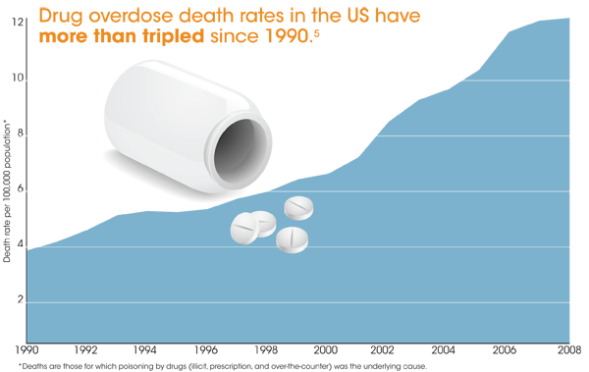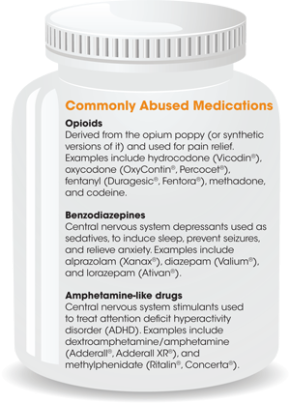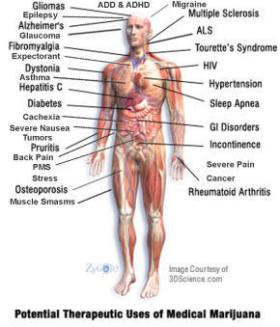Tags
Abuse, Ban, DEA, Drug Abuse, FDA, Federal Government, Hydrocodone, Marijuana, Medical, Medicinal, Opioids, Policy, Zohydro
By: Madeline Garcia-Gilbert
Massachusetts Governor Deval Patrick and The Department of Public Health seem to have quite a battle on their hands juggling the issues like: handling drug abuse given the increase in addiction overdoses, the FDA approval of the new extended release form of hydrocodone opioid – Zohydro, and the passage of Medical Marijuana.
Drug abuse
An article published April 2014 by RT News stated that “[a] 2013 report from the Drug Enforcement Administration found that 4.5 million Americans are abusing pain relievers,” highlighting some of the concerns states are facing around the approval of ZOHYDRO.
Data from the Center for Disease Control and Prevention state that Drug overdose deaths have more than tripled since 1990 as a result of prescription medication. The graph below provides a visual picture of the increase.
Click on the following link for a look at trends in the prevalence of various drugs.
A recent overturn by the US Federal Government, of Massachusetts’s Governor Deval Patrick’s proposed ban on Zohydro, comes during a spike in opioid related deaths in Massachusetts, and during a time when The Massachusetts Department of Public Health continues reviewing applications on proposed programs and sites for the medical marijuana dispensaries scheduled to open during the summer of 2014. “[I]n the last 12 months, more than 360,000 prescriptions for extended-release opioids were dispensed in Massachusetts, according to Zogenix’s (Zohydro manufacturers) statement as stated in EMS World article.”
For those wanting to understanding what an opioid is, please click here.
What’s the fuss around Zohydro?
Zohydro was first approved by the FDA in 2013. Recently, the federal government overturned Governor Deval Patrick’s imposed ban on Zohydro in Massachusetts around concerns of increased opioid related deaths in the state. Zohydro is an opioid, extended release form of hydrocodone used to manage severe, round the clock pain relief.
One more opioid on the market! What’s the fuss, right? WRONG!
Supplying a total 12 hour pain relief in each dose, and more concentrated than hydrocodone, the danger with Zohydro, is that if crushed, it would deliver a 12 hour dose IMMEDIATELY! If inhaled, or injected, it can potentially cause death by respiratory distress. (Reuters article, Zohydro’s warning label.)
A little on hydrocodone
Hydrocodone, a commonly used prescribed medication for pain management is cautioned as being an opioid (narcotic) that may be habit-forming. It was recently recommended that it be reclassified from a schedule III to a schedule II drug which will provide additional restrictions on its monitoring. FDA drug safety on hydrocodone! This drug is the concentration pain killer in Zohydro.
Medical Marijuana
Reuters quoted the FDA in a statement where they said that “[b]oth the prevention of prescription opioid abuse and appropriate pain management are top public health priorities at FDA. Actions to advance one should not impede the other.”
Facts concerning the matter of medical marijuana in Massachusetts:
- Medicinal marijuana was voted in by 63% of voters November 2012.
- There are monitoring methods in place to adequately track dispensary marijuana sales.
- 181 Applications soliciting to open dispensaries have been submitted.
- 8 of those applications were suggested to pick other sites than those proposed.
- 20 applications have been preliminarily approved.
- Hardship subsidies will be available to minimize disparities in access to medical marijuana.
- Medical marijuana dispensaries are projected to opening this summer 2014 in Massachusetts.
- Known to aid in treatments for:
- Prevents cell cancer formation due to THC pro-apoptotic in cancers such as Prostate and Breast cancer.
- Great for asthma – has a bronchodilator effect due to THC
- Severe pain management
- Glaucoma
- GI symptoms – for example: Crohn’s disease, and nausea
- Fibromyalgia
- Systemic Lupus
- Spinal injuries
- Pain
- Multiple Sclerosis
- ADHD, PTSD, ADD, Bi-Polar
- Insomnia
- depression
- Seizures
- Increases appetite
- It has no associated known violence associated.
Current obstacles for preliminarily approved medical marijuana dispensaries:
Recently, the globe published an article alleging that the Federal DEA is now, using what many of us can consider bullying tactics, to pressure physicians involved with medical marijuana dispensaries to either give up their association with dispensaries, or lose their licenses to prescribe medications. Globe article.
Is the DEA thinking consumer, or huge pharmaceutical benefits? Another article published by Natural Society states that the federal government and DEA are trying to stop marijuana research no matter what. Read more.
Projections put in place by the Massachusetts Department of Public Health have been slow to progress. By the end of March 2014, MDPH was supposed to have concluded their dispensary inspection phase which consisted of:
- Grow ready inspections
- Processing ready inspections and
- Retail ready inspections.
Once the inspections were completed MDPH would issue final certificates of registration to approved dispensary sites to allow them to open during the summer 2014. Once dispensaries open, the DPH has continuous oversight responsibilities that include as indicated by their provisional trajectory as posted on the Mass.gov website, which includes annuals renewal of certificates, spot checks, and random audits. Given that such a complete monitoring process has been put in place, one would think that consumers would have the option to use medicinal marijuana for managing severe pain, as opposed to resorting to the addictive and potentially deadly opioid – Zohydro.
Given the dangerous and addictive components of opioids like Hydrocodone and it successor Zohydro, the ongoing battle on getting a handling drug abuse to minimize the current increase in deaths resulting from overdoses, and the legalization of medicinal marijuana for the use for pain, it is surprising that the DPH is behind on getting medical marijuana dispensaries up and running. They have the authority to implement, monitor and shut down dispensaries. Given the recent opioid overdoses resulting from prescribed painkillers, one would think that the option of using medicinal marijuana for pain control, while being monitored for efficacy, would give individuals using opioids a more dangerous opioid an option to be safe.
In my opinion, I would urge the DPH to set forth in opening the dispensaries and monitoring them for efficacy. This could potentially decrease the opioid deaths by overdose currently devastating our state. I welcome thought, suggestions, and differences of opinions to be shared.
Resources:
For additional policy resources concerning medical marijuana in Massachusetts, please visit, http://www.mpp.org/states/massachusetts/.
Documentary on over 30 years of government funded Medicinal affects of marijuana, https://www.youtube.com/watch?v=8Md2WNqqxTQ&list=UU876oMEYf4jjBdEMibloYRA&index=3.
Video testimonies on medical marijuana and its the benefits they have found, are provided in the links below. I hope you take the time to view and enjoy the information they offer.
Medicinal benefits form Juicing marijuana leaves and its benefits: http://tv.naturalsociety.com/woman-uses-raw-cannabis-juice-in-place-of-40-medications/
A child with cancer: http://tv.naturalsociety.com/woman-uses-raw-cannabis-juice-in-place-of-40-medications/
References:
Boston Globe, DEA targets doctors linked to medical marijuana. (2014) http://www.bostonglobe.com/metro/2014/06/05/drug-enforcement-administration-targets-doctors-associated-with-medical-marijuana-dispensaries-physicians-say/PHsP0zRlaxXwnDazsohIOL/story.html?s_campaign=8315, retrieved June 9, 2014.
Center for Disease Control and Prevention, Injury Prevention and Control. (2014) http://www.cdc.gov/homeandrecreationalsafety/rxbrief/, retrieved June 11, 2013.
EMS World, (2014) States’ Pill Bans Get Cheers, Criticisms. http://www.emsworld.com/news/11381874/states-pill-bans-get-cheers-criticisms, retrieved June 8, 2014
Health Day News for a healthier living, Today’s heroin addict abusers often middle-class suburbanites: Study. (2014) http://consumer.healthday.com/mental-health-information-25/addiction-news-6/today-s-heroin-abusers-often-middle-class-suburbanites-688256.html, retrieved June 8, 2014
Marijuana Policy Project (MPP) (2014) http://www.mpp.org/states/massachusetts/, retrieved June 8, 2014.
MedLine Plus, National Institute of Health (2013) Hydrocodone. http://www.nlm.nih.gov/medlineplus/druginfo/meds/a601006.html
National Library of Medicine. Daily Med. (2014) http://dailymed.nlm.nih.gov/dailymed/about.cfm, retrieved June 9, 2014.
Partnership for drug-free kids, (2014) Zohydro Sales Banned in Massachusetts. (http://www.drugfree.org/join-together/zohydro-sales-banned-in-massachusetts/, retrieved June 11, 2014.
Reuters News (2014) States begin to ban dangerous new FDA-approved painkiller. http://rt.com/usa/mass-vermont-ban-zohydro-473/, retrieved June 9, 2014.
Reuters.com website. (2014) Massachusetts bans sale of FDA-approved Zogenix painkiller. http://www.reuters.com/article/2014/03/28/us-usa-drugs-opioids-zogenix-idUSBREA2R1F920140328, retrieved June 10, 2014.
Zohydro warning label pdf, (2014) http://www.google.com/url?sa=t&rct=j&q=&esrc=s&source=web&cd=3&ved=0CCwQFjAC&url=http%3A%2F%2Fwww.fda.gov%2Fdownloads%2Fdrugs%2Fdrugsafety%2Fucm374009.pdf&ei=p5qYU5TBIMmqyASA_4DYCg&usg=AFQjCNFBxaVsv7W-8d-ccEqYH7T1wshvEQ&bvm=bv.68693194,d.aWw&cad=rja, retrieved June 8, 2014



